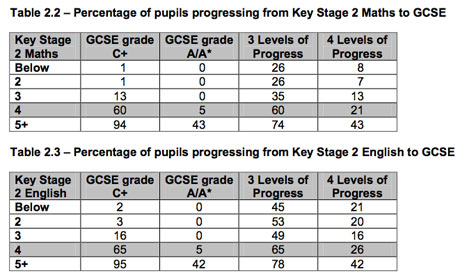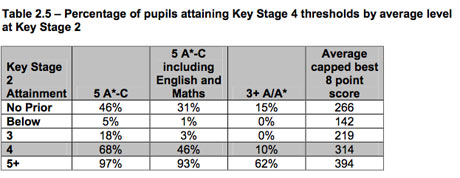
But what do they tell us about children's abilities?
Every child is expected to get a "level four" in the key stage two tests at the end of primary school. In English this means they are an "active" reader who "infers, predicts, visualises and reads 'between the lines". They will be able to write extended sentences and use commas appropriately. In maths, it means being able to add, subtract and divide in their heads, know the multiplication tables up to 10x10 and to plot coordinates on a graph.
This year 74% of children got a level four in both English and maths, 21% got a level five – which means they are working beyond the level expected for an 11-year old. A small minority of 6% were lagging behind at the level expected of a seven-year old in English and 5% in maths. That difference was even more marked when the results are broken down by gender. One in ten 11-year old boys has a reading age of just seven.
I was interested to know what the relationship is between key stage two test results at 11 and children's chances of getting good GCSEs at the end of secondary school.
This research (pdf) offers some answers. The following tables shows the proportion of children at the various levels in the tests at 11 who then went on to get a good GCSE in the same subject. It is based on the results of more than 600,000 teenagers who took GCSEs in 2008 and where they were available their key stage two test results as well.
 Key stage 2 - GCSE progression English and maths
Key stage 2 - GCSE progression English and maths
 Key stage 2 - GCSE progression science
Key stage 2 - GCSE progression science
These show that 60% of pupils who got a level four in maths went on to get above a C at GCSE – but only 5% achieved an A or A star. Some 65% who got a level four in English subsequently got above a C at GCSE and only 5% an A or A star. The science test results (which have been dropped since this study was conducted) are a poorer indicator of later success. Only 32% who got a level two went on to get a double GCSE with a grade above a C.
But the government's target is now for all children to get five good GCSEs (above a grade C) including English and maths. This table shows that while 68% of pupils with a level four get five or more GCSEs grade C or above, only 46% - less than half – get five including English and maths.
 Percentage of pupils attaining key stage 4 by average level key stage 2
Percentage of pupils attaining key stage 4 by average level key stage 2
Level four may be the "expected" level for 11 year olds, but only 46% of children in this study who got it went on to get good GCSEs including the all important English and maths.
But some experts believe there is another problem: that each level is too broad and hides a huge variation in ability. Each level is broken down at school level into sub-groups A-C, though these results are not published nationally. Roy Blatchford, founder of the National Education Trust and former headteacher, govenrment advisor and Ofsted inspector, says that the difference between a child who is graded level four A and level four C is huge. He's looked at data for individual authorities and found that 95% of children in those authorities who got a level four A at primary school went on to get grades above a C at GCSE – almost as good as getting a level five. Meanwhile those graded level four C are getting much lower results – potentially significantly below the national average of 60% going on to achieve a good GCSE.
Blatchford told me:
For me the golden key is a four A, which is more likely to covert to good GCSEs. To say all children should get four is masking underachievement if you want all children to get a C at GCSE. I'm not criticising schools but the nation should wake up and say it's not about progress but attainment. All teachers should be unequivocally focussed on getting children to the four A level.
Blatchford also makles a compelling argument here that primary schools should focus on ensuring that every child is reading at an appropriate level for their age, as the best preparation for secondary schoo.
Others are sceptical about the relationship between results of tests spread over years, arguing that children develop at different rates.
Warwick Mansell, the education journalist and author of Education by numbers, one of the most comprehensive books about the system of testing children, argues that the association between key stage two and GCSE results should not be overplayed. He told me:
I'm sceptical about associations and people who put a big emphasis on it implying it's causation. It's wrong to suggest that a kid who has a bad day on the test isn't going to get their GCSE.
Dylan Wiliam, emeritus professor of educational assessment at the Institute of Education, told me that level fours are associated with a diverse range of GCSE results:
What's extraordinary is the diversity. The better you do at key stage two the better you do at key stage four but it's all still to play for. You encourage kids and say: nothing you can do changes where you are now, but everything you do will now change where you can be.
If you are looking at a 100m sprint the one who is ahead is going to win; kids who find learning the subject easier at 11 will get to the GCSE more easily. But people look at an association and see a causation. It's not straightforward.
Important note to learn and Read Quran online
The Holy Quran is the word of Allah; it has been sent down to guide us and the guidance can online be gained through reading quran online. No other book can be like holy quran. As you come to the learn tajweed quran, Allah speaks to you and reading Arabic Quran is to hear Him, even to converse with Him, and to walk in His ways. So it is must for us as a Muslim to learn and do quran memorization by heart and the Quran tutor should teach the kids from quran qaida and then teaching quran online along with the quran tafseer and let the kids memorize quran so that we as Muslim could learn quran tajweed rules and then understand the quran tafseer It is the encounter of life with the Life-giver. 'God - there is no god but He, the Ever-living, the Self-subsisting (by whom all subsist) He has sent down upon you the Book with the Truth ... as a guidance unto mankind ...' (Al 'Imran 3: 2-3 learn quran recitation). So we should always remember the guidance of Allah and we should be listening to quran online along with obeying the commandments of Allah so let us join hands to lean the Koran and let our kids do quran memorization and learn the teaching of quran education online and apply them in there life there is kids quran lesson available online as well

No comments:
Post a Comment